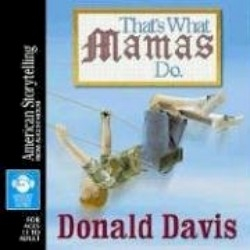That's What Mamas Do
The unwritten contract between young Donald and Joe Davis and their mother was that she was always aware of “that’s what boys do” and she always responded in her own way because “that’s what mamas do.” Part family vignette and part morality tale, these four stories celebrate the author’s mother-a pragmatic elementary school teacher who never allowed her sons to get the best of her.
At the end of the day, they were astonished by their mother’s commentary on their day’s activities. She knew when they had taken something that did not belong to them, when they had tipped over their swing set and righted it before anyone got home, and the way they treated their aged babysitter. Even in her old age, she slyly acknowledges having kept secrets from her sons that they thought they had kept from her. She always knew how they got into the house when they missed their curfew but saw no reason to tell them because as she explained, “I knew how you both got in and I knew which one of you was in and if I had caught you, I’d have to get up out of bed.”
Young Donald, dubbed “my baby” until elementary school and “Mrs. Davis’s son” afterwards, likens his mother’s pronouncements to “the voice of God.” The lives of the residents in his hometown were so intertwined that his parents seemed omniscient.
Perhaps ironically, the most memorable track, “Jack Moore Builds a House,” takes on small town convention. Everyone in town is bothered by the fact that the Moores don’t attend church every Sunday morning like everyone else in town. The ten year old Davis, who is helping build their house “whether they needed my help or not,” has honed his ability to find out about his neighbors by repeating his mother’s comments. He also added some new words to his vocabulary in the process. The gentle Moores, who are “Ladder Day Saints,” teach the author more about tolerance that he ever learned in his mother’s Sunday school.
While the author has won several awards for storytelling and writing, his nasal accent may bother new listeners. The storyteller’s greatest tribute to his mother and hometown is that his sweet fables remind audiences of all ages to be kind, polite, and caring members of society. His nostalgic tone is reminiscent of The Andy Griffith Show and The Waltons.
Reviewed by
Pam Kingsbury
Disclosure: This article is not an endorsement, but a review. The publisher of this book provided free copies of the book to have their book reviewed by a professional reviewer. No fee was paid by the publisher for this review. Foreword Reviews only recommends books that we love. Foreword Magazine, Inc. is disclosing this in accordance with the Federal Trade Commission’s 16 CFR, Part 255.

